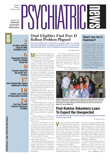Substance abuse and other mental disorders cost the nation's employers as much as $17 billion a year, according to a year-long study by the National Business Group on Health (NBGH).
Indirect costs associated with mental illness, including substance abuse, range between $79 billion and $105 billion a year, the group says.
In an interview with Psychiatric News, NBGH Vice President Ron Finch said the study and its recommendations emphasize the importance of integrating services and programs across employee benefits, including employee assistance programs (EAPs), disability benefits, and health insurance coverage.
The NBGH, headquartered in Washington, D.C., represents 240 mostly large employers and advocates for their perspective on health care issues.
Care Lacks Integration
Finch said that mental health carveouts had cut costs as much as possible in the last two decades, while also fragmenting the care of workers with comorbid conditions.
“Over the last several years the cost of health care has been brought down and contained as much as it can be,” he said. “I think employers understand that they have to focus on improving and maintaining the overall health status of beneficiaries in their plans.
“But one of our major findings is that behavioral health, like general health, is fragmented and lacks integration. It is fairly rare to find employers that have well-integrated employee assistance, disability health care, and preventive health programs. Those that do have lower disability costs and less use in general of their health care plans. They also have better outcomes with those chronic conditions where there is comorbid depression.”
Funded by the Center for Mental Health Services of the Substance Abuse and Mental Health Services Administration, the NBGH study was conducted by the National Committee on Employer-Sponsored Behavioral Health Services.
The NBGH formed that committee to review the state of employer-sponsored behavioral health services and develop recommendations to improve the design, quality, structure, and integration of programs and services. The committee also reviewed the recommendations of the President's New Freedom Commission on Mental Health to determine how they might apply to employer-sponsored mental health benefits and programs.
The committee consisted of 25 experts including academic researchers, disability-management professionals, EAP professionals, health care benefit specialists, representatives from managed care and mental health carveout companies, and medical directors and benefit managers from member NBGH companies.
APA President Steven Sharfstein, M.D., said the group's findings, and the prominence of NBGH as a leader in promoting innovative health care strategies in the workplace, underscore the widening recognition of the value of mental health and substance abuse treatment by the nation's employers.
“The National Business Group on Health has taken the lead in promoting access to behavioral health care as an essential component of good business practice,” he told Psychiatric News. “There is increased recognition that treatment works, and workplace interventions combined with good insurance coverage pay for themselves many times over.”
Chronic Conditions Require Collaboration
Finch said that the NBGH findings stress the value of collaboration between primary care and mental health specialists and of treatment by specialists where appropriate.
“Currently, the primary care and general medical system has become the default mental health system, with about 70 percent of mental health cases being seen in primary care, with the main mode of treatment being antidepressants or other psychotropic medications without concurrent psychotherapy,” he noted.
Benefit designs that favor treatment in the primary care setting are driving the phenomenon, he said. “Deductibles are much lower for primary care, and that is driving utilization to the primary care setting. But we are concerned that clinical effectiveness is much lower than when patients are being seen by behavioral health specialists,” Finch said.
He pointed out that this study underscores the need for collaboration between general medicine and mental health specialists in the care of patients with chronic conditions—such as diabetes and heart disease—in which there is significant comorbid mental illness.
“Without access to indicated treatments [in mental health care insurance coverage], patient compliance with disease management is undone,” he said. “This is costing employers dollars in terms of clinical outcome.”
Finch also highlighted the organization's concerns about the costs of disability to employers, saying mental health problems and associated time away from work are the highest-cost item for disability plans. “We are finding that patients are being certified as disabled at the general medical setting, with initial certification of disability being up to two months, with medication as the only treatment they are receiving,” he said.“ Without an active treatment plan, this initial period of disability disconnects the employee from the workplace without engaging the employee in an active treatment plan.”
For this reason, NBGH recommends that employees in these circumstances be certified by a mental health care specialist with an active treatment plan and that employees on disability be referred to the company's EAP to ensure transition back to work.
A report on the study with its 12 findings and 18 recommendations is posted at<www.businessgrouphealth.org/pdfs/fullreport_behavioralhealthservices.pdf>.▪
